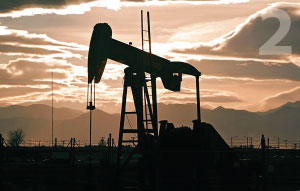 |
SuperStorm Sandy
Hurricane Sandy made landfall in Jamaica on Wednesday, October 24, 2012. The storm turned deadly in the Caribbean, and a hurricane/winter storm hybrid decimated regions along the U.S. East Coast. Officials at a UN meeting on climate change have cited the support of scientists in claiming that devastating storms like Hurricane Sandy are not purely "coincidental" but actually affected by global warming. |
 |
The Fracking debate
The hydraulic fracturing debate heated up this year as multiple provinces and states contemplated the natural gas drilling process. Fracking is a technique that involves the injection of millions of litres of water and thousands of litres of unidentified chemicals underground at very high pressure in order to create fractures in the underlying shale rock formations and extract the natural gas below the surface. Fracking for unconventional gas is rapidly expanding in almost every province across Canada. Environmental groups oppose fracking because of its high water use, carbon emissions, and the danger it can pose to groundwater. |
 |
Arctic sea ice
Levels hit record lows this September- the ice extent covering 49 per cent below the 1979 average, when satellite records began. Scientists continued to emphasize the role that humans play in these changes. "It's crystal clear. If we burn all the fossil fuels, we create certain disaster," NASA scientist James Hansen warned. |
 |
Toxic Chemical Concerns
Parents were given more to worry about this year as reports suggested that the chemicals replacing their problematic predecessors were similarly toxic. The "BPA-free" label also faced scrutiny this year, as experts questioned the labeling regulation process. |
 |
BP Oil Spill Aftermath
In November, BP pleaded guilty to felony charges related to the Gulf oil spill, including charges of manslaughter and lying to Congress about the size of the leak. For these charges, the company is expected to pay $4.5 billion, the biggest corporate criminal penalty in U.S. history. |
Wednesday, 2 January 2013
Our Top 10 Green News Stories of 2012: 1-5
As 2012 draws to a close, here is a review of our Top Environmental News Stories of 2012. Today we reveal numbers 1 to 5. Stay tuned for the second half of our Top 10 stories to be posted later this week.
Subscribe to:
Post Comments (Atom)

No comments:
Post a Comment